- Home
- Site Index
- About Me
-
My Books
- Book List & Themes
- Strictly for Adults Novels >
-
Tales from Portlaw
>
- No Need to Look for Love
- 'The Love Quartet' >
-
The Priest's Calling Card
>
- Chapter One - The Irish Custom
- Chapter Two - Patrick Duffy's Family Background
- Chapter Three - Patrick Duffy Junior's Vocation to Priesthood
- Chapter Four - The first years of the priesthood
- Chapter Five - Father Patrick Duffy in Seattle
- Chapter Six - Father Patrick Duffy, Portlaw Priest
- Chapter Seven - Patrick Duffy Priest Power
- Chapter Eight - Patrick Duffy Groundless Gossip
- Chapter Nine - Monsignor Duffy of Portlaw
- Chapter Ten - The Portlaw Inheritance of Patrick Duffy
- Bigger and Better >
- The Oldest Woman in the World >
-
Sean and Sarah
>
- Chapter 1 - 'Return of the Prodigal Son'
- Chapter 2 - 'The early years of sweet innocence in Portlaw'
- Chapter 3 - 'The Separation'
- Chapter 4 - 'Separation and Betrayal'
- Chapter 5 - 'Portlaw to Manchester'
- Chapter 6 - 'Salford Choices'
- Chapter 7 - 'Life inside Prison'
- Chapter 8 - 'The Aylesbury Pilgrimage'
- Chapter 9 - Sean's interest in stone masonary'
- Chapter 10 - 'Sean's and Tony's Partnership'
- Chapter 11 - 'Return of the Prodigal Son'
- The Alternative Christmas Party >
-
The Life of Liam Lafferty
>
- Chapter One: ' Liam Lafferty is born'
- Chapter Two : 'The Baptism of Liam Lafferty'
- Chapter Three: 'The early years of Liam Lafferty'
- Chapter Four : Early Manhood
- Chapter Five : Ned's Secret Past
- Chapter Six : Courtship and Marriage
- Chapter Seven : Liam and Trish marry
- Chapter Eight : Farley meets Ned
- Chapter Nine : 'Ned comes clean to Farley'
- Chapter Ten : Tragedy hits the family
- Chapter Eleven : The future is brighter
-
The life and times of Joe Walsh
>
- Chapter One : 'The marriage of Margaret Mawd and Thomas Walsh’
- Chapter Two 'The birth of Joe Walsh'
- Chapter Three 'Marriage breakup and betrayal'
- Chapter Four: ' The Walsh family breakup'
- Chapter Five : ' Liverpool Lodgings'
- Chapter Six: ' Settled times are established and tested'
- Chapter Seven : 'Haworth is heaven is a place on earth'
- Chapter Eight: 'Coming out'
- Chapter Nine: Portlaw revenge
- Chapter Ten: ' The murder trial of Paddy Groggy'
- Chapter Eleven: 'New beginnings'
-
The Woman Who Hated Christmas
>
- Chapter One: 'The Christmas Enigma'
- Chapter Two: ' The Breakup of Beth's Family''
- Chapter Three: From Teenager to Adulthood.'
- Chapter Four: 'The Mills of West Yorkshire.'
- Chapter Five: 'Harrison Garner Showdown.'
- Chapter Six : 'The Christmas Dance'
- Chapter Seven : 'The ballot for Shop Steward.'
- Chapter Eight: ' Leaving the Mill'
- Chapter Ten: ' Beth buries her Ghosts'
- Chapter Eleven: Beth and Dermot start off married life in Galway.
- Chapter Twelve: The Twin Tragedy of Christmas, 1992.'
- Chapter Thirteen: 'The Christmas star returns'
- Chapter Fourteen: ' Beth's future in Portlaw'
-
The Last Dance
>
- Chapter One - ‘Nancy Swales becomes the Widow Swales’
- Chapter Two ‘The secret night life of Widow Swales’
- Chapter Three ‘Meeting Richard again’
- Chapter Four ‘Clancy’s Ballroom: March 1961’
- Chapter Five ‘The All Ireland Dancing Rounds’
- Chapter Six ‘James Mountford’
- Chapter Seven ‘The All Ireland Ballroom Latin American Dance Final.’
- Chapter Eight ‘The Final Arrives’
- Chapter Nine: 'Beth in Manchester.'
- 'Two Sisters' >
- Fourteen Days >
-
‘The Postman Always Knocks Twice’
>
- Author's Foreword
- Contents
- Chapter One
- Chapter Two
- Chapter Three
- Chapter Four
- Chapter Five
- Chapter Six
- Chapter Seven
- Chapter Eight
- Chapter Nine
- Chapter Ten
- Chapter Eleven
- Chapter Twelve
- Chapter Thirteen
- Chapter Fourteen
- Chapter Fifteen
- Chapter Sixteen
- Chapter Seventeen
- Chapter Eighteen
- Chapter Nineteen
- Chapter Twenty
- Chapter Twenty-One
- Chapter Twenty-Two
-
Celebrity Contacts
-
Thoughts and Musings
- Bereavement >
- Nature >
-
Bill's Personal Development
>
- What I'd like to be remembered for
- Second Chances
- Roots
- Holidays of Old
- Memorable Moments of Mine
- Cleckheaton Consecration
- Canadian Loves
- Mum's Wisdom
- 'Early life at my Grandparents'
- Family Holidays
- 'Mother /Child Bond'
- Childhood Pain
- The Death of Lady
- 'Soldiering On'
- 'Romantic Holidays'
- 'On the roof'
- Always wear clean shoes
- 'Family Tree'
- The importance of poise
- 'Growing up with grandparents'
- Love & Romance >
- Christian Thoughts, Acts and Words >
- My Wedding
- My Funeral
- Audio Downloads
- My Singing Videos
- Bill's Blog
- Contact Me
Going That Extra Mile

The true distinction between a celebrity and a star can often be measured in the degree that some of our more famous faces are prepared to go that extra mile in helping to bring a bit of happiness into the life of others. The person chasing celebrity status in their 15-minutes-of-fame bid on our television reality shows will never aspire to the star status that has taken some of our very best entertainers a lifetime to achieve.

During the years 1990 to 2005, I was privileged to meet, have ongoing contact with and draw upon the support of a great many number of stars and famous names from the world of royalty, politics, film, television, radio, theatre, art, sport and church etc., etc.
And while all of these stars were troopers in their own right, a few went far beyond the call of duty in order to bring a bit of much needed happiness into the life of another. They couldn't do enough for the children and I felt confident that even had I persuaded them that 'The Great Wall of China' was a children's icon that was at risk of falling down and I'd appreciate it if they would give up a week's labour to help rebuild part of it, to make the children of Yorkshire happy, that many would have done so! Not because it was me who asked them, but because they all loved children. That is why so many over fifteen years were prepared to (at their own expense), travel to Yorkshire and freely read my books/stories to assemblies of school children (Almost 800 famous names). Others, like Dame Vera Lynn and Dame Norma Major elected to read one of my books in a school from the area in which they lived. It is such acts of total selfishness about which I now write.
And while all of these stars were troopers in their own right, a few went far beyond the call of duty in order to bring a bit of much needed happiness into the life of another. They couldn't do enough for the children and I felt confident that even had I persuaded them that 'The Great Wall of China' was a children's icon that was at risk of falling down and I'd appreciate it if they would give up a week's labour to help rebuild part of it, to make the children of Yorkshire happy, that many would have done so! Not because it was me who asked them, but because they all loved children. That is why so many over fifteen years were prepared to (at their own expense), travel to Yorkshire and freely read my books/stories to assemblies of school children (Almost 800 famous names). Others, like Dame Vera Lynn and Dame Norma Major elected to read one of my books in a school from the area in which they lived. It is such acts of total selfishness about which I now write.
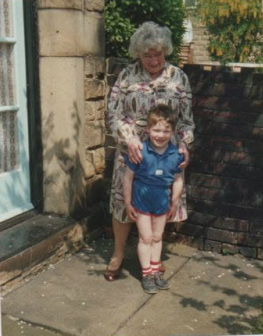
Many years ago, I was blessed to come across a marvellous woman who I grew to love and greatly respect, Miss Henrietta Denton. Etta, (the name I affectionately named her), was a young woman of 84 years when we first met. She was a spinster who had lived a life of both loving and dutiful service to her mother, brother, neighbours and community.
Born during the Edwardian era, she could type, speak four languages, play the piano, do the Times crossword, cook and make her own clothes. She was denied a grammar school education when her father died and instead went to work in the mills. For the next 20 years, Etta nursed, cared and fended for a bed-bound mother and her own brother who never married. She is pictured here with my son, William, as a young boy.

It was during the early 1940s that her only sweetheart was killed in the war. I'll never forget the day she recounted these feelings of loss to me about her wartime sweetheart and particularly, how she and others like her, had to grieve alone in silence when the marriages they had dreamed of never came to be. Her story moved me to write the poem 'Arthur and Guinevere', which can be obtained by clicking on the link here.
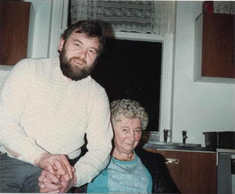
A God-fearing woman, Etta performed her expected duty to her mother and then her bachelor brother until he also died. She had passed the age of 60 years before she was free to pursue her own life. Around the age of 40 years, Etta developed a curvature of the spine that continued to deteriorate. She spent the rest of her life constantly viewing more of the ground upon which she walked than the sky above her, and only ever saw the person she spoke to when she and they adopted a half-sleeping posture. She is pictured here with myself.
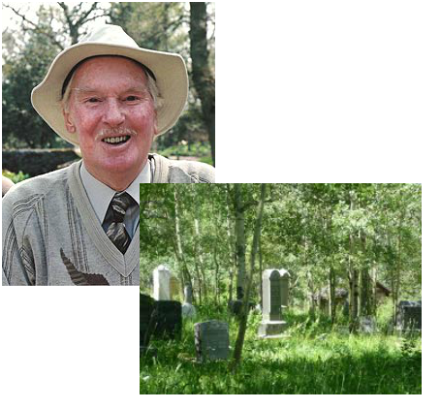
Between the age of 66 and 92 years, Etta displayed good general health and a robust constitution. Most of her life-long friends had been dying off at regular monthly intervals in all the years I knew her and the ones who were still alive, lived mostly in Old Folk’s Homes. Tuesdays were routinely allocated to visiting the graves of her dearly departed family and friends, and every Thursday was given over to visiting poorly and infirmed friends (the overwhelming majority of them being much younger than Etta herself). She would go whatever the weather or the cost, and would always bring flowers on her visits to the cemetery or take home-made cake, scones and jars of jam to the ones in an Old Folk's Home. All of her fare was wrapped neatly in brown paper wrapping.
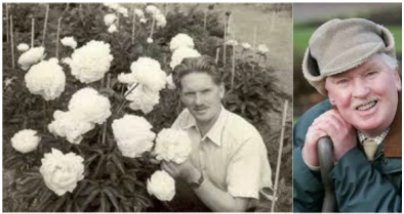
When Etta became 86 years of age, her garden (which she loved) was starting to become overgrown and somewhat untidy. Her daily interests were cooking, reading, playing the piano and talking to me. She only ever watched two television programmes; ‘Countdown’, presented by Richard Whiteley and ‘Gardener’s World’ presented by Geoffrey Smith.
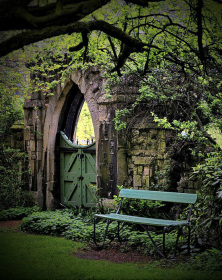
As I was experiencing a bit of trouble with my own mobility at the time, I was unable to do the gardening myself which I usually did for her. Etta loved her garden so much that she wouldn’t trust anybody else to do it who wasn’t 'qualified’. You see, all of her plants weren't just plants to her; they were much more! They repesented a tapestry of her life's experiences and an album of the significant people who had ever graced her life.The garden of Gothic House had a large variety of plants, many of which I couldn't name and all which had happily grown there for over forty years.
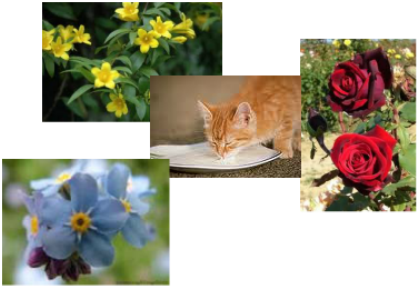
For example, after her mother died, a rose bush of remembrance was purchased by Etta and her brother Stanley. That bush was eventually pruned and replanted when she moved house years later. Another flower had been planted when a dear friend of hers had given birth to a child she had waited for over ten years to conceive. When a girl was eventually born, the jaundiced infant was christened Jasmine. Naturally, the choice of plant could only have been Jasmine. Even the death of a tabby that she came to befriend had some Forget Me Nots planted in a corner of Etta's garden for remembrance. Indeed, she was never the cat's owner, but used to feed it each morning when it turned up on her doorstep and wouldn't leave until it had been provided with a saucer of milk. Whether it was to commemorate life or death, occasions of happiness or sadness, Etta's garden acted as a 'memory bank' and ensured that she would never forget the people she loved. Hence, she was fearful that if someone did her garden who couldn't tell the difference between a nettle and some mint, a flower or a weed, that they might pull up one of her precious plants or unknowingly stamp all over her garden of memories.
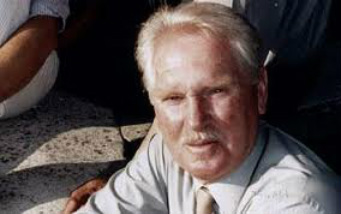
“Leave it to me,” I remember saying as I left her house one evening after I'd decided that the unkempt garden couldn't be left untended any longer. Two weeks later, celebrity television gardener and long-standing friend, Geoffrey Smith was reading for me in a Kirklees School. Geoffrey had read for me four times then and we instantly became more than mere acquaintances. His readings would always be followed by a chat, a pint and a meal before he returned to his home in Kettlesing, near Harrogate.
As we spoke that day I told Geoffrey that I’d received a letter from the Honours Committee who had indicated that I’d been recommended for an MBE and they were wanting to know if I was offered one would I accept. Being as much in sympathy with republicanism as royalty, I wasn’t sure if I ought to accept. Geoffrey persuaded me, saying that it would be disrespectful to all the thousands of people who’d supported my writing and charitable ventures over the years if I didn’t accept. I told him I would.
Then I told him about my closest of friends, my substitute/adopted mother, the remarkable Etta Denton and how he could help her considerably with a few hours of his time in her garden. Good old Geoffrey said he'd only be too pleased to help out anyone as kind as Etta was.
As we spoke that day I told Geoffrey that I’d received a letter from the Honours Committee who had indicated that I’d been recommended for an MBE and they were wanting to know if I was offered one would I accept. Being as much in sympathy with republicanism as royalty, I wasn’t sure if I ought to accept. Geoffrey persuaded me, saying that it would be disrespectful to all the thousands of people who’d supported my writing and charitable ventures over the years if I didn’t accept. I told him I would.
Then I told him about my closest of friends, my substitute/adopted mother, the remarkable Etta Denton and how he could help her considerably with a few hours of his time in her garden. Good old Geoffrey said he'd only be too pleased to help out anyone as kind as Etta was.
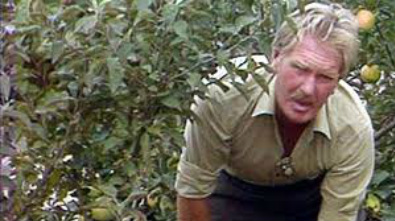
Etta's home had been one of the earliest dwellings built in Mirfield and was called 'Gothic House'. About three weeks after I'd spoken with Geoffrey, I knocked on her door one afternoon and asked her to give me and a visitor to her home a cup of tea. Geoffrey bent down so she could see him. Etta could hardly believe her eyes. We all spoke for about half an hour, after which Geoffrey asked Etta to show him her garden. Geoffrey spent about an hour in Etta’s garden, (he made me promise not to inform the press at the time), and as he was bent down to pull out a weed, the next door neighbour (a veritable nosey parker whom Etta didn’t like) duly popped her head over the wall and snidely remarked, ”It’s about time the old woman got someone in to tidy it!” Geoffrey stood up and simply smiled before resuming his weeding. The neighbour looked gobsmacked and no doubt wondered how Etta could possibly have afforded the services of television personality and gardener Geoffrey Smith to weed and tend her little garden and prune her three apple trees.

On the day of her 87th birthday, both Etta and her nosey parker of a neighbour had another surprise. On the morning of her birthday, Richard Whiteley was reading for me at a Dewsbury school. Richard and myself had met six years earlier and he'd read for me on a dozen occasions in a Yorkshire school. After the reading, instead of going for a pint and a meal as we usually did, I told Richard about Etta and provided him with a birthday card to sign and asked him to deliver it personally to Etta at 'Gothic House' before he returned home.

Etta was naturally over the moon to have had both of the only two people she ever watched on television personally visit her at home. When Richard was leaving, I made sure that the nosey next door neighbour saw him through the corner of her window curtains before we let him drive off. I asked Richard to pip his car loudly on both arrival and departure so that the next-door nosy parker would pull her curtains.
While the overwhelming majority of people I sought to help during these years were everyday folk, I once remember helping to give a present to a couple of millionaires that their money couldn't buy them. It is possible to bring a special piece of happiness into the lives of wealthy people also.
It was back in the mid 90s when a couple from Cheshire became millionaires overnight when they won the lottery. The female half of the duo had made a wish list, but also pointed out that money couldn’t get them everything they wanted. The couple were fanatical gardeners, and their favourite person was (you guessed it), my dear friend Geoffrey Smith.
I spoke with Geoffrey on the phone and the upshot was that within a few weeks, Geoffrey had personally invited the couple to his home and had shown them around his garden. Geoffrey had always been curious about meeting a lottery winner, not because he prized the amassing of money but because he said, ‘they are people one reads of, but never meets’.
While the overwhelming majority of people I sought to help during these years were everyday folk, I once remember helping to give a present to a couple of millionaires that their money couldn't buy them. It is possible to bring a special piece of happiness into the lives of wealthy people also.
It was back in the mid 90s when a couple from Cheshire became millionaires overnight when they won the lottery. The female half of the duo had made a wish list, but also pointed out that money couldn’t get them everything they wanted. The couple were fanatical gardeners, and their favourite person was (you guessed it), my dear friend Geoffrey Smith.
I spoke with Geoffrey on the phone and the upshot was that within a few weeks, Geoffrey had personally invited the couple to his home and had shown them around his garden. Geoffrey had always been curious about meeting a lottery winner, not because he prized the amassing of money but because he said, ‘they are people one reads of, but never meets’.

Geoffrey was always pleased to hear about unusual presents that created surprises. The best present he once told me he had ever received was when his wife Marjory reportedly bought him ‘a field’ adjacent to their home grounds which he turned into a wild meadow. And I know that his greatest pleasure in the years prior to his death was to go on early morning walks. Gardening and Nature were one and the same to Geoffrey. He was the most gentle and kindest of human beings I ever knew, and he remained resistant to all offers of big money throughout his height-of-fame years and thereafter. He turned down a fortune by refusing to sell his name to the television advertisers.
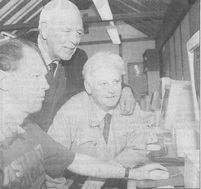
Towards the back half of 1993, ‘R.M.Grylls Middle School’ on Windy Bank Estate, Liversedge, (where I grew up), was publishing my book, ‘Maw’ to raise funds for a local hospice, 'Martin House'. I allowed the pupils of the school to do their own art work for the book illustration and even to arrange for its printing. I then arranged for Roy Castle to read from their book on the morning of its publication, but then he was hospitalised for cancer treatment and was unable to carry out his engagement for me. The late footballer, John Charles willingly stood in for Roy. John also visited the Disabled Centre in Dewsbury at my request, a only 24 hour's notice rather than have the school children disappointed unnecessarily.
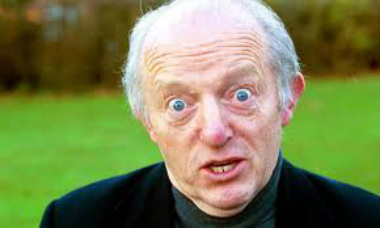
Before the day of the book launch, I had arranged for the television magician, the late Paul Daniels to record the story, thereby enabling the school to have its own reminder of the special day long after it had passed. Paul spent over 12 hours recording the story on a master tape, and it was only after Paul sent me with the tape that I learnt that like Roald Dahl, Paul did all his recording from the comforts of his garden shed at the bottom of his garden!
Paul was a most generous man who was prepared to give his time to go that extra mile. I was very sad to read in the press before he died that he accidentally sliced off two of his fingers in the very same shed whilst doing some work there.
Paul was a most generous man who was prepared to give his time to go that extra mile. I was very sad to read in the press before he died that he accidentally sliced off two of his fingers in the very same shed whilst doing some work there.
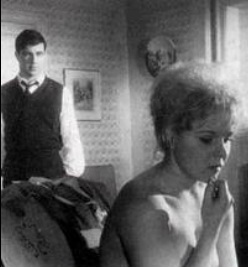
Another friend of mine and frequent reader of my books in schools was the late Stan Barstow, author of ‘A kind of Loving’ in 1960. That novel made him a publishing success overnight and when the story was filmed a few years later, Stan had become a Northern favourite and one of ‘the angry young men’ from the 50s and 60s. Stan and I were peas in a pod in many ways. Both our fathers had been miners and although older than me, we'd both sowed our wild oats in the fields of the West Ridings during the 60s. I loved a pint and a chat with Stan on the half dozen times we’d meet throughout the year, and he remained a good friend until he died.

Stan loved literature and the spoken word. I once recall him telling me that had he been able to choose his timing of achieving literary success, he would have preferred to have written his best-selling book in 1980 or 1990 and not at the beginning of his career as an author in 1960 when it burst onto the shelves of the Northern bookworm.
Between 1993 and 1996, I used to run the ‘Literary Lottery.’ This was an idea dreamt up by me for generating necessary monies to help pay for some of the expenses that were necessary to pay for the operation of my charitable projects. I persuaded over a hundred famous authors and celebrities who’d written books to donate a signed copy of their works for auction. Each month throughout the year, for a subscription of £24, the 'Literary Club' of dozens of members would have their names drawn from a hat by the Mayor of Mirfield and the winner would personally receive an autographed book from a famous author. You see, not only did they win an autographed book by a famous person, but I also arranged for the famous person to hand the book over personally to them wherever and whenever possible.
Between 1993 and 1996, I used to run the ‘Literary Lottery.’ This was an idea dreamt up by me for generating necessary monies to help pay for some of the expenses that were necessary to pay for the operation of my charitable projects. I persuaded over a hundred famous authors and celebrities who’d written books to donate a signed copy of their works for auction. Each month throughout the year, for a subscription of £24, the 'Literary Club' of dozens of members would have their names drawn from a hat by the Mayor of Mirfield and the winner would personally receive an autographed book from a famous author. You see, not only did they win an autographed book by a famous person, but I also arranged for the famous person to hand the book over personally to them wherever and whenever possible.
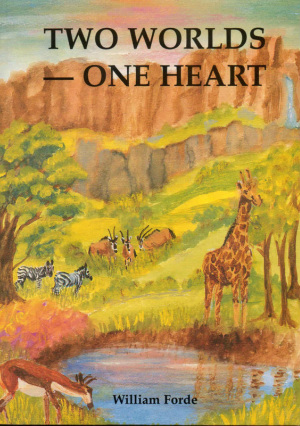
In addition to this task, I always published two books per year on average. This required a stable of artists who illustrated my book covers and inside pages. One of the books I was writing was an African story. That book was entitled, ‘Two Worlds-One Heart’ and was subsequently praised by Nelson Mandela who phoned me in person.
I ideally wanted the artist who illustrated this African story to be acquainted with the country of South Africa and its ways. I eventually tracked down a lady artist who fitted my requirements; Mary Jackson from Earlsheaton, Dewsbury.
I instantly liked Mary from the start. She was a widow but had lived in Africa for over 20 years as the wife of a British Diplomat. I told her about the story theme and the nature of the pictures I wanted painting for the book. She understood that she wouldn’t be paid for her work and seemed prepared to take it on.
Mary started the paintings (around sixteen illustrations in total). Four months after starting the project she started to go blind. She insisted upon carrying on with the voluntary commission, even though she would now require a magnification glass to see the painting and the work would naturally take longer. For the next two years, her eyesight deteriorated and yet she persisted in the work she’d undertaken until it was complete.
I ideally wanted the artist who illustrated this African story to be acquainted with the country of South Africa and its ways. I eventually tracked down a lady artist who fitted my requirements; Mary Jackson from Earlsheaton, Dewsbury.
I instantly liked Mary from the start. She was a widow but had lived in Africa for over 20 years as the wife of a British Diplomat. I told her about the story theme and the nature of the pictures I wanted painting for the book. She understood that she wouldn’t be paid for her work and seemed prepared to take it on.
Mary started the paintings (around sixteen illustrations in total). Four months after starting the project she started to go blind. She insisted upon carrying on with the voluntary commission, even though she would now require a magnification glass to see the painting and the work would naturally take longer. For the next two years, her eyesight deteriorated and yet she persisted in the work she’d undertaken until it was complete.
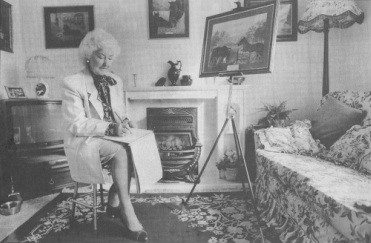
Mary died within one year of completing the project in 1996. Although the book she had illustrated had represented nothing less than ‘paintings of love’ by her, sadly she wasn’t alive to see it published in 2000 and to learn of Nelson Mandela’s praise. I was however able to please her greatly in 1995/96 (the year before she sadly died),when she was the winer of the ‘Literary Lottery’. Prior to the winner being drawn from the hat that month, I had publicly said that as usual, I would pull out all my contact stops and I would endeavour to arrange for the author of that month’s signed book to present the book to the winner in person.

Having made the announcement, part of me feared that I might have bitten off more than I could chew. Having proved myself a miniature ‘Bill will fix it’ character over the years, I didn’t relish having to admit failure. So when Mary’s name came out of the hat that month, I was praying that the author of the winning book wouldn’t be Margaret Thatcher. Neither did I want it to be someone like Michael Palin who regularly supplied me with signed copies of his books to auction. I didn't fancy the image of Michael having to be brought home kicking from his travels around the world!
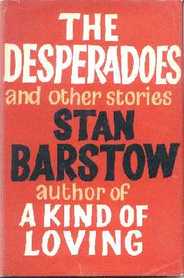
As it happened 'Lady Luck' could not have dealt me a kinder card. My heart started to settle back down when the winning book that month, 'The Desperadoes and Other Stories' was written by my old friend and drinking buddy, Stan Barstow. Stan lived less than 20 miles away in Haworth at the time and one phone call and lucnch and a pint afterwards was all that was required to keep my reputation as a ‘fixer’ intact.
Mary’s eyes lit up when I visited her home with my ‘surprised visitor’ who remained anonymous until she met him face to face. We chatted and had elevenses at Mary’s house then all three of us went to lunch. I excused myself earlier in order that Mary could enjoy her time with Stan who had been a favourite of hers for many years. I was so pleased that I was able to give Mary that special moment before she died and that I had a friend like Stan who was prepared to make it possible.
Mary’s eyes lit up when I visited her home with my ‘surprised visitor’ who remained anonymous until she met him face to face. We chatted and had elevenses at Mary’s house then all three of us went to lunch. I excused myself earlier in order that Mary could enjoy her time with Stan who had been a favourite of hers for many years. I was so pleased that I was able to give Mary that special moment before she died and that I had a friend like Stan who was prepared to make it possible.

In early 2000, my book ‘Robin and the Rubicellie Fusiliers’ was published. Being a story about London during the Blitz, the very first person chosen to read it to school children was the ‘Force’s Sweetheart, Dame Vera Lynn’. She read the book to a school in Ditchling where she lived and although I'd planned to be there, illness prevented me after I incurred two heart attacks within the space of one week.
Not long after, I had cause to write to Dame Vera again after I’d met a man in Mirfield called Fred. Fred had been a widower for a number of years. A man of simple means, Fred was a ‘make do person’ wherever possible. His favourite person was Vera Lynn and the only adornment in his modest house was a framed image in pride of place on the centre of his mantle piece. However, the image of Vera was a newspaper image that he’d cut out and framed almost 20 years earlier. The heat of many years had brown and creased the newspaper image, yet Fred still kept it in pride of place on his mantle piece.
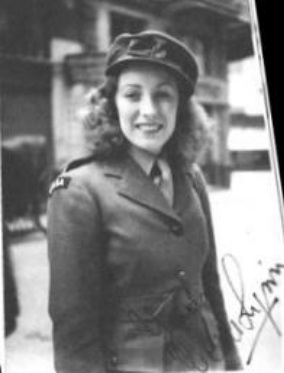
Having had previous contact with Dame Vera, I wrote to her and told her about this ardent fan in his mid 70s. I requested a signed photograph be sent to him which could be used to replace the framed newspaper cutting that had adorned his fireplace since before the death of Fred’s wife. Dame Vera was as expected only too willing to supply Fred with an autographed photograph. However, she was so overcome by his adoration of her that she sent him her most treasured snap shot; an original of her in uniform in her 20s.
Fred cried when I handed him the photograph along with the letter, which accompanied it from Dame Vera. What a woman. No wonder we won the war with her on our side! Vera used to be my late mother's favourite wartime singer and mum would always make us hush up whenever she sang on the wireless. If only mum had known that during later years that Vera and her oldest boy (myself) would become established friends, she would have been immensely proud.
I have had many autographed items given to me personally over the years by famous people, and have willingly been prepared to give them to be auctioned for charitable causes, but the only two items I have ever retained was Dame Vera's signature on my own book about the 'Second World War' years that she both read to school children and praised to the press, along with a signed copy of the CD that was released last year to celebrate Dame Vera's 100th birthday.

Geoffrey Smith, Richard Whitely, Stan Barstow, Paul Daniels, John Charles, and Dame Vera all brought that extra bit of happiness into the life of others by being prepared to ‘go that extra mile,’ just as our brave soldiers had been prepared to do on the poppy fields of Flanders during the First and Second World Wars.
It is people such as these that have helped to make Britain 'great' over the years and have managed to preserve our 'freedom' and sense of community spirit.
All of the 'unfamous' people I have referred to in this account of people who were prepared to 'Go that extra mile' have earned their place in my own eyes, alongside the celebrity names mentioned. In their own lives, they too went that extra mile to help another. God bless them one and all!
Copyright William Forde March, 2012: 9Updated in March, 2018).
It is people such as these that have helped to make Britain 'great' over the years and have managed to preserve our 'freedom' and sense of community spirit.
All of the 'unfamous' people I have referred to in this account of people who were prepared to 'Go that extra mile' have earned their place in my own eyes, alongside the celebrity names mentioned. In their own lives, they too went that extra mile to help another. God bless them one and all!
Copyright William Forde March, 2012: 9Updated in March, 2018).
